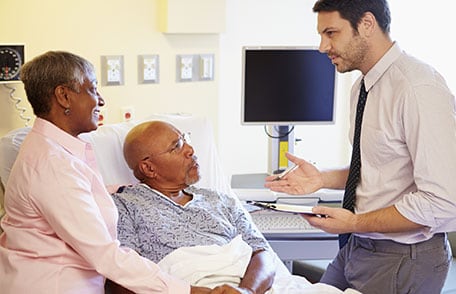Have You or a Family Member Had Colorectal (Colon) Cancer?

Having a family health history of colorectal (colon) cancer can make you more likely to get colorectal cancer yourself. If you have close family members with colorectal cancer, collect your family health history of colorectal and other cancers, and share this information with your doctor. Be sure to have any screening tests that your doctor recommends. If you have had colorectal cancer, make sure that your family members know about your diagnosis, especially if you have Lynch syndrome.
Why is it Important to Know Your Family Health History?
If you have a family health history of colorectal cancer, your doctor may consider your family health history when deciding which colorectal cancer screening might be right for you. For example, if you have a close family member who had colorectal cancer at a young age or have multiple close family members with colorectal cancer, your doctor may recommend the following:
- start screening at a younger age,
- get screened more frequently,
- use colonoscopy only instead of other tests, and
- in some cases, have genetic counseling.
The genetic counselor may recommend genetic testing based on your family health history. When collecting your family health history, be sure to include your close relatives: parents, brothers, sisters, children, grandparents, aunts, uncles, nieces, and nephews. List any cancers that each relative had and at what age he or she was diagnosed. For relatives who have died, list age and cause of death.
What is Lynch Syndrome and Why is it Important to Know if You Have it?
In some cases, colorectal cancer is caused by an inherited genetic condition called Lynch syndrome, also known as hereditary nonpolyposis colorectal cancer or HNPCC. About 3% (1 in 30) of colorectal cancer cases are due to Lynch syndrome. People with Lynch syndrome are much more likely to develop colorectal cancer, especially at a younger age (before 50), and women with Lynch syndrome are much more likely to get endometrial (uterine) cancer. People with Lynch syndrome also have an increased chance of getting other cancers, including ovarian, stomach, liver, kidney, brain, and skin cancer. If you or your family members are found to have Lynch syndrome, your doctor can help you take steps to reduce your risk of getting cancer in the future or to find it early if you get it.
Lynch syndrome is hereditary, meaning that it is caused by an inherited genetic changes, or mutations, that can be passed from parents to children. If you have Lynch syndrome, your parents, children, sisters, and brothers have a 50% (1 in 2) chance of having this condition. Your other close relatives are also at increased risk of having Lynch syndrome.
After surgery to remove colorectal cancer, tumor tissue samples are often screened to see if the tumor could have been caused by Lynch syndrome. In some cases, additional testing is needed to know for sure if the tumor was caused by Lynch syndrome. If you have had colorectal cancer in the last few years, your tumor may have been checked for Lynch syndrome. In some cases, endometrial (uterine) tumors are checked. Genetic counseling and testing for Lynch syndrome also might be recommended for you if:
- You were diagnosed with colorectal cancer in the past
- You have been diagnosed with endometrial cancer (especially before age 50)
- You have several family members with colorectal or other cancers associated with Lynch syndrome
- You have a family member with Lynch syndrome
If you have been diagnosed with Lynch syndrome, talk to your doctor about your increased chances of getting the other cancers caused by Lynch syndrome. Your doctor might recommend additional regular screening to check for these cancers or other actions you can take to prevent cancer. Be sure to let your family members know if you have Lynch syndrome. Once a mutation that causes Lynch syndrome is found in one person in a family, other family members can then be tested for that mutation to find out if they have Lynch syndrome.
If you are concerned about your personal or family health history of colorectal cancer, talk to your health care provider. In addition, you can visit the web sites below to find information on colorectal cancer, Lynch syndrome, cancer genetic testing, and genetic counseling services.























.png)











No hay comentarios:
Publicar un comentario